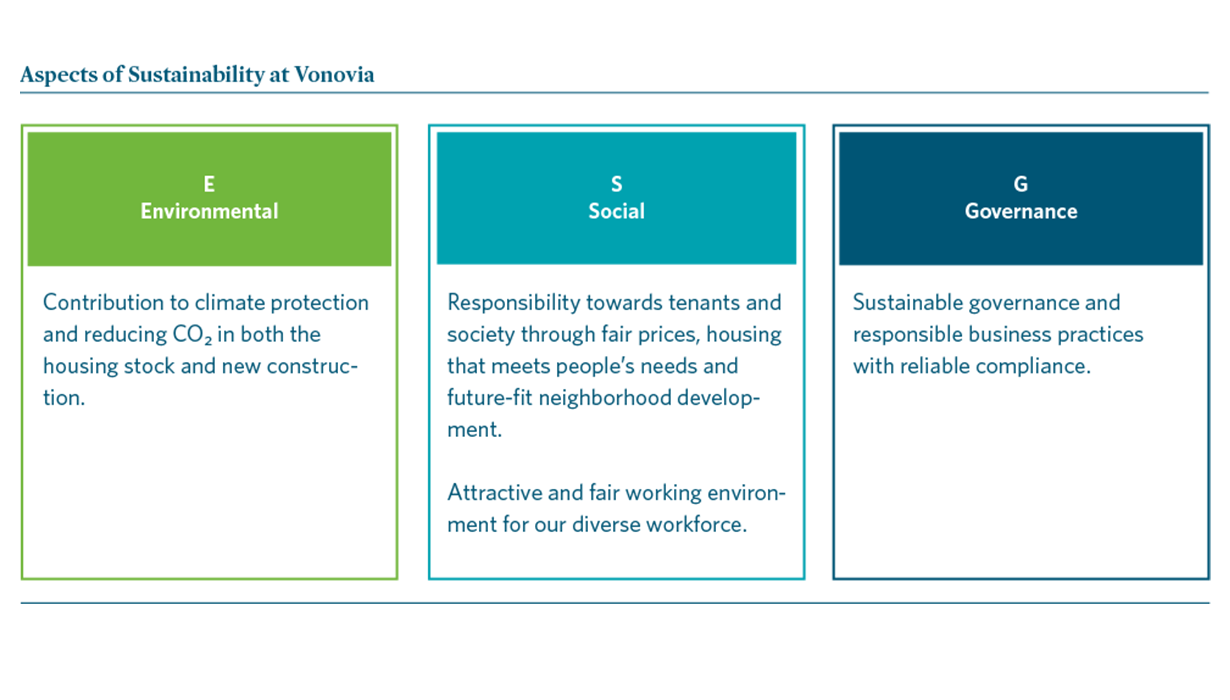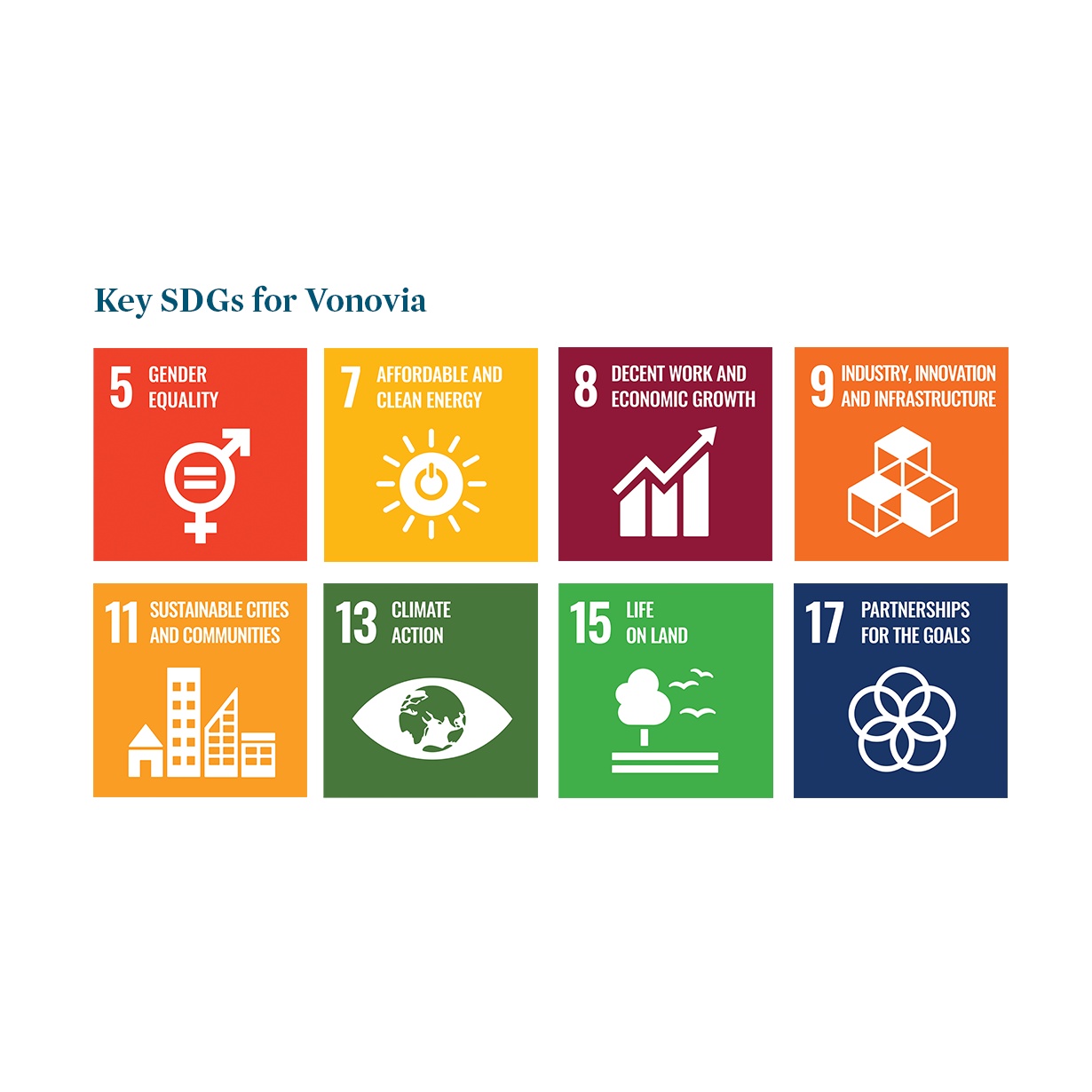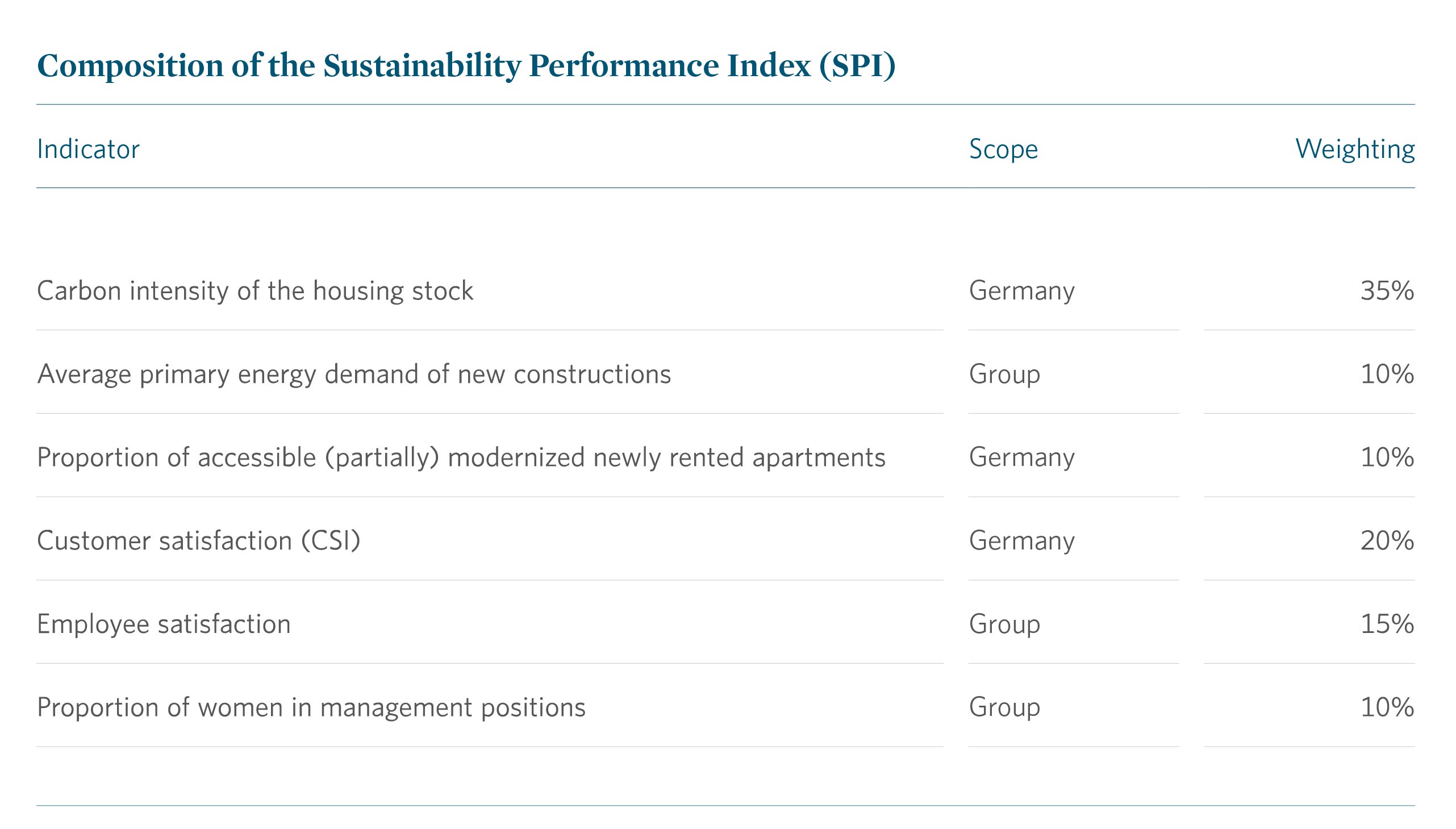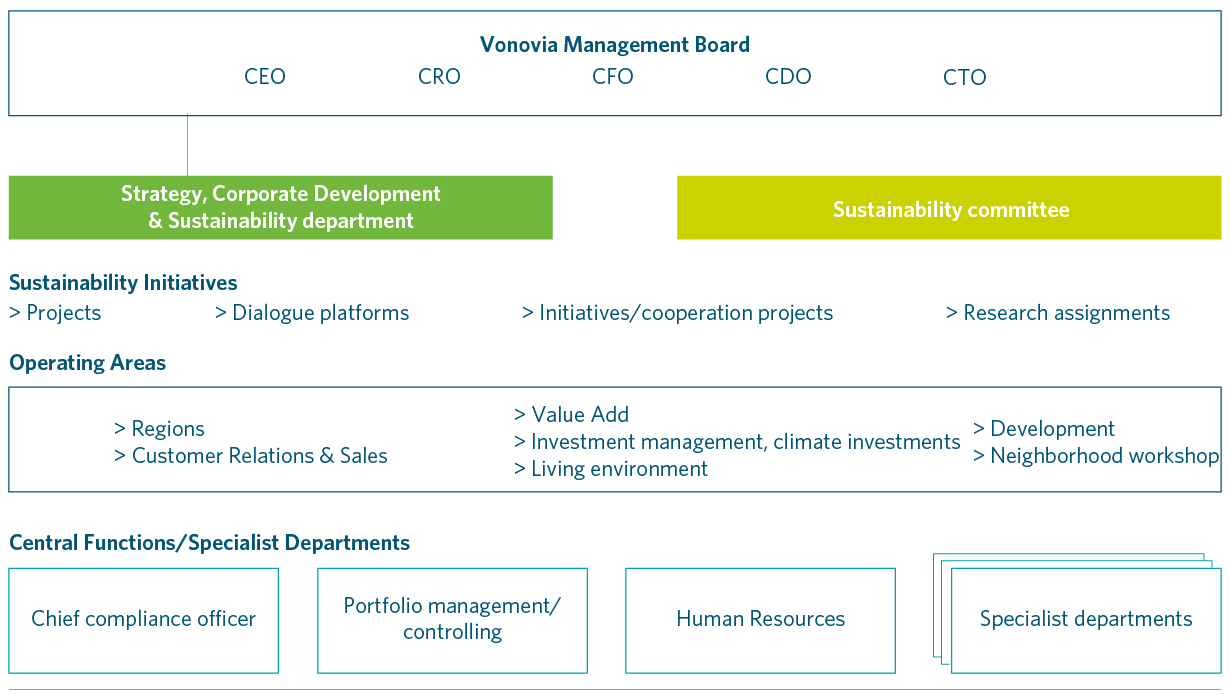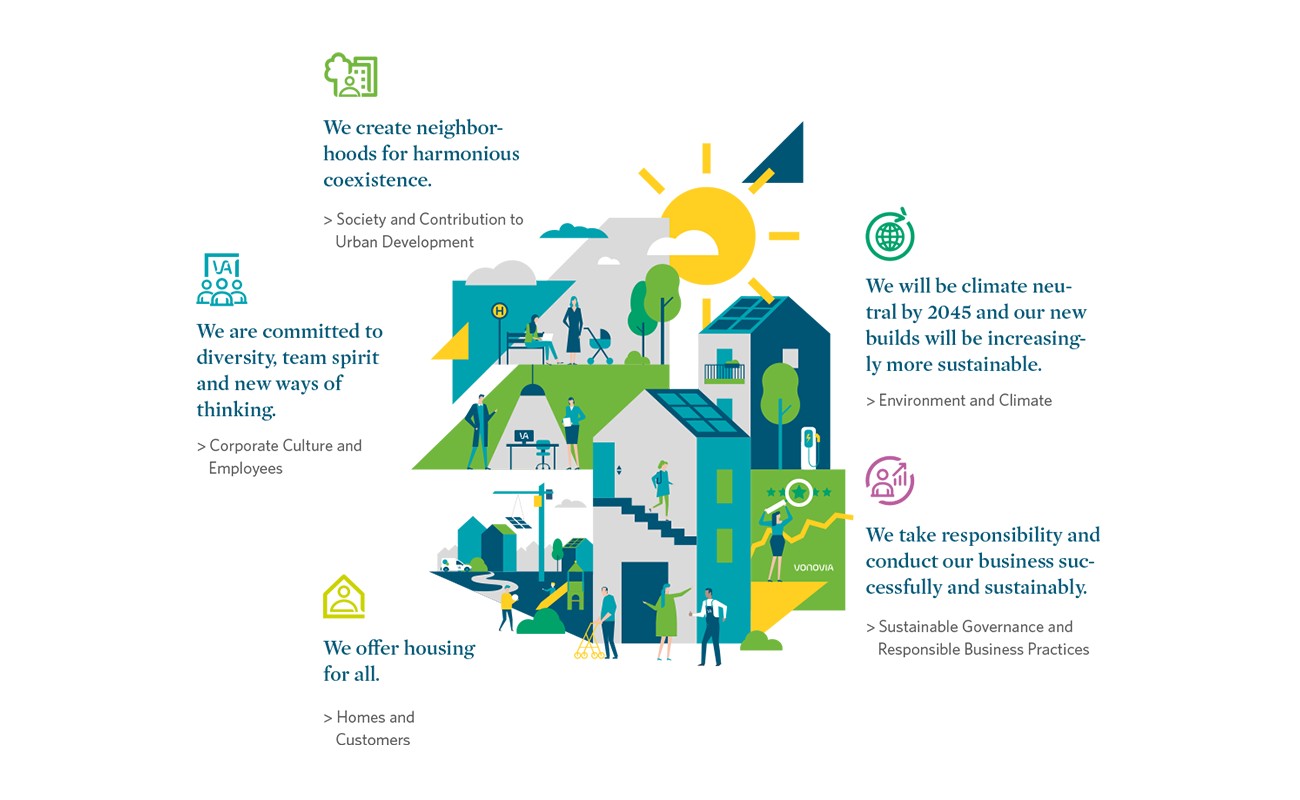Act reliably
Our Annual Report
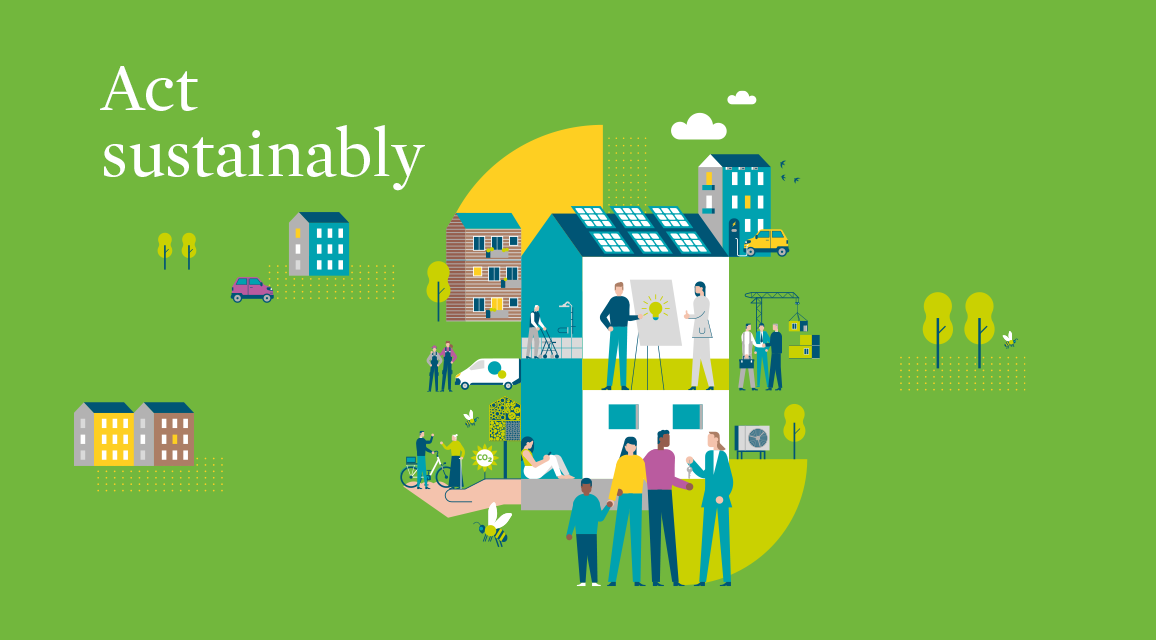
For us, sustainability does not just mean that we take the environment into account – social issues are also at the center of our business activities. We consider cities and neighborhoods in their entirety, with their many different residents who each have their own individual lifestyles. Based on this approach, we seek to develop solutions that ensure a sustainable future for living and construction. Vonovia provides homes that are both attractive and affordable at the same time. This means we are acting in the interest of a socially and economically sustainable future for the housing industry. We focus on integrated measures, taking into account changing environmental, business and political requirements – and, in particular, the individual needs of our tenants. We have therefore firmly integrated sustainability into our business processes and strategy.
Sustainable action is an integral part of Vonovia’s corporate identity. We continuously develop our sustainability-oriented agenda to account for societal, political, environmental, and economic changes. Transparent reporting in accordance with the European Sustainability Reporting Standards (ESRS) supports us in describing the interplay between the impacts of our business activities and our sustainability-related opportunities and risks on Vonovia’s stakeholders, and in aligning these with our business processes.
In shaping our sustainability strategy, Vonovia also aligns itself with international standards and frameworks, such as the Sustainable Development Goals (SDGs), the UN Global Compact, the UN Guiding Principles on Business and Human Rights, and the OECD Guidelines for Multinational Enterprises. As an internationally active company, we aim to contribute to achieving these goals through our business operations in Germany, Austria, and Sweden. To this end, we have identified eight key SDGs that guide our actions. We used our materiality analysis (for more information, please refer to our current Annual Report) to establish priorities. This also forms the basis for our ESRS sustainability reporting.
Our value chain is divided into the upstream supply chain, our own business operations, and the downstream stages of our value creation. Our business activities encompass the following core areas: construction, rental, and property management activities, including neighborhood development and customer service, as well as the provision of property-related services (for more information, see the strategy section of the current Annual Report).
The strategy, which will continue to have a commercially successful business model at its core, explicitly addresses the following sustainability topics:
Concretely, this means for us:
E: With our 1.5°C-aligned climate path, we are committed to achieving a climate-neutral building stock by 2045, with binding annual interim targets. Successful implementation requires both a high level of renovation depth and increased decentralized use of renewable energies for heat and power supply in our neighborhoods. The neighborhood is the central implementation level for achieving climate protection goals and CO2 reduction in the building stock. In new construction and redevelopment, the use of renewable energy and sustainable materials plays a key role for us.
S: As a social actor, we take responsibility for our tenants, customers, and employees. We focus on socially responsible and transparent rents and view the expansion of needs-based, social infrastructure—including the integration of innovations and new technologies—as an integral part of our neighborhood development. In doing so, we aim to shape an urban, ecological, and affordable housing offer with social responsibility. Additionally, we face the growing challenge of a skilled labor shortage. To ensure a sufficient and professionally qualified workforce, we offer our employees an attractive working environment characterized by diversity and personal development opportunities.
G: It is part of our self-image to always ensure compliance and a corporate culture that meets current (legal) requirements. In this regard, we rely on reliable, transparent, and trustworthy corporate governance, guided by the best practices of the German Corporate Governance Code. Compliance with laws and internal and external guidelines is a matter of course for us and a fundamental prerequisite for being perceived as a reliable and trustworthy partner.
In terms of external guidelines and principles, Vonovia’s strategy is aligned to international standards and frameworks, such as the Sustainable Development Goals (SDGs), the UN Global Compact and the United Nations Guiding Principles on Business and Human Rights. As a company with international operations, we aim to contribute to achieving these goals with our business in Germany, Austria and Sweden. To this end, we have identified eight central SDGs that guide our actions (see graphic on the right).
With our business model – developing and renting high-quality, modern, and affordable housing – we are in strong interdependence with social and environmental change processes. Sustainability is therefore a core component of our corporate strategy. In recent years, we have made significant progress in embedding sustainability into the company’s business processes. With the introduction of the non-financial performance indicator SPI in 2021, the strategy has been linked to clear, compensation-relevant targets for the Management Board and the top management (first level below the Management Board).
Sustainability is a top management responsibility at Vonovia. The Chief Executive Officer (CEO) is responsible for sustainability at Vonovia. On the Supervisory Board side, the Strategy, Finance, and Sustainability Committee, as well as the Audit Committee for reporting matters, perform the respective oversight functions.
Vonovia has a dedicated Sustainability department, reporting directly to the CEO, which drives and continuously coordinates the company’s sustainability efforts in line with its strategy and business model. Key responsibilities of this unit include further development of the sustainability strategy, deriving and monitoring sustainability targets, initiating and implementing sustainability projects, and overseeing sustainability reporting. This includes not only the sustainability disclosures in the annual report but also the preparation of the ESG Factbook and the handling of numerous ESG ratings.
A sustainability committee meets three to four times a year, as needed, to advise on strategic decisions and assess sustainability performance. The committee consists of the entire Management Board, along with the heads of Sustainability, Corporate Communication, Controlling, Accounting, and Investor Relations. This structure ensures that decisions related to implementing our sustainability strategy are supported by all relevant departments and carried through to the operational levels on the ground.
The operational implementation of sustainability aspects takes place across all relevant specialist departments and regions, right into our neighborhoods on site. Sustainable principles are part of every employee’s mindset. In this way, we develop future-proof living environments in close dialogue with our tenants and for the cities, municipalities, and regions in which we operate.
In Austria and Sweden, sustainability coordination is embedded within the respective staff units. These units coordinate the interaction between the central Sustainability department and the respective countries, as well as the country-specific sustainability strategies of the Austrian BUWOG companies and the Swedish Victoriahem.
We have assigned our key sustainability topics to five thematic areas of action in order to describe Vonovia’s sustainability approach in a more meaningful and practical way, independent of the rigid reporting framework of the EU. These areas form the basis of our sustainability communication.
1. In the area of Environment and Climate, we pursue the goal of reducing CO2 emissions in our existing building portfolio as well as in sustainable new construction and redevelopment.
2. In our Society and Contribution to Urban Development action area, we are committed to creating livable neighborhoods.
3. Our Homes and Customers action area focuses on our efforts to provide our tenants with attractive housing that is suited to their requirements and life circumstances.
4. This is made possible by our diverse and creative workforce, whose issues and concerns are taken into account in the Corporate Culture and Employees action area.
5, The Sustainable Corporate Governance and Responsible Business Practices action area stipulates the guidelines and principles of our corporate governance as well as compliance. In this realm, we ensure our sustainable and long-term success on the capital market for our future viability.
In light of the introduction of the new sustainability reporting directive, Vonovia conducted a materiality analysis based on the ESRS for the first time in 2023. This builds on Vonovia’s previous materiality assessments. A detailed description of how we determined our material topics can be found in our current Annual Report. Vonovia systematically manages the main sustainability topics for the company referring to the double materiality concept in respect to two dimensions:
We consider and incorporate the perspectives of our relevant stakeholder groups in our assessment of material topics. A list of all sustainability topics material to Vonovia can be found in the current Annual Report.
As a result from this review, our materiality matrix, compiles 10 identified material topics and 14 other important sustainability topics in five action areas.
Definition of the Material Topics
We identify and assess the impacts – both negative and positive – and their materiality (in terms of extent, scope and irreversibility) on and by the company in an ongoing process as well as sustainability-related opportunities and risks. In 2024, we once again performed a critical review of all topics against the backdrop of integration and consolidated reporting, as well as new regulations and changes in general conditions. This did not result in any changes to the previous assessment.
